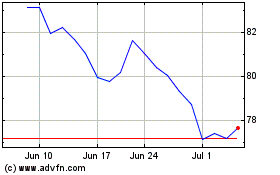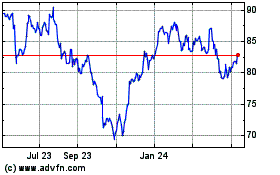Less-Invasive Treatment Yielded Similar Outcome as Open-Heart Surgery, Study Finds
March 17 2017 - 9:29AM
Dow Jones News
By Jeanne Whalen
A minimally invasive procedure to repair diseased heart valves
delivered about the same health outcomes for patients as open-heart
surgery, a result doctors say could widen use of the new
procedure.
The study, published in the New England Journal of Medicine and
set for presentation Friday at the American College of Cardiology's
annual meeting, compared the procedures in patients with aortic
stenosis, a common disorder where blood flow from the heart is
restricted due to narrowing of the aortic valve opening.
In the minimally invasive procedure, an artificial valve made by
Medtronic PLC was fed to the patients' hearts through a tube
inserted into a large artery in the groin. The procedure is known
as transcatheter aortic valve replacement, or TAVR. Patients in the
other group received whatever artificial valve the surgeon deemed
appropriate, via open-heart surgery.
The 1,746 patients selected for the trial were judged to have a
3% to 15% chance of dying within 30 days if they underwent
open-heart surgery, a range surgeons deem an "intermediate risk."
The minimally invasive procedure is already widely performed in
patients who would have a higher risk of dying after surgery. It
has been less scrutinized in lower-risk patients.
Medtronic funded the trial and supplied its artificial valves,
called CoreValve and Evolut R, for use in the TAVR patients. The
company said it has submitted the trial results to the Food and
Drug Administration and requested permission to market its valves
for use in intermediate-risk patients. The FDA last year gave
competitor Edwards Lifesciences permission to sell its valves for
intermediate-risk patients.
The main goal of the Medtronic study was to track the number of
patients who died from any cause or had a disabling stroke after 24
months. The results presented Friday were from a planned interim
analysis based on the number of deaths and strokes reported after
most of the patients had been followed for 12 months. The
researchers used this data to project the likely results after 24
months. The trial continues and will include a final analysis after
all patients are followed for 24 months.
The interim results showed that TAVR and open-heart surgery
produced about equal results. The estimated incidence of death or
disabling stroke at 24 months in the TAVR group was 12.6%, versus
14% in the open-heart surgery group, a difference that wasn't
statistically significant, meaning it could have been due to
chance. The mean age of patients in the trial was 80.
TAVR's benefits over surgery include more rapid recovery for the
patient, and the lack of anesthesia needed to perform the
procedure, according to Michael Reardon, a leader of the study and
professor of cardiothoracic surgery at Houston Methodist DeBakey
Heart & Vascular Center. Patients are sedated but remain awake
during the procedure, and are typically out of bed and walking
around the same day, he said. One month after their procedures in
the study, patients who underwent TAVR reported higher
quality-of-life scores than surgery patients did, he said.
The procedures were associated with different adverse events.
Patients in the open-heart surgery group had a greater need for
blood transfusions, and higher rates of acute kidney injury and
irregular heartbeat known as atrial fibrillation. Patients in the
TAVR group were more likely to have leaks from their artificial
valves. They also required the implantation of pacemakers more
frequently -- 25.9% of patients in the TAVR group needed them,
versus 6.6% in the surgery group -- because the TAVR procedure was
more likely to damage tissue that helps transmit the heart's
natural electrical signals, according to Robert Bonow, a cardiology
professor at Northwestern University's Feinberg School of Medicine,
who wasn't involved in the trial.
Dr. Bonow said the need for pacemakers with TAVR "does raise
some issues as we evolve the technology into younger and less sick
people." Still, he said the cardiology field is already shifting to
performing more TAVR procedures in intermediate-risk patients.
This week, new treatment guidelines published by the ACC and
American Heart Association for the first time deemed TAVR as
equally suitable for intermediate-risk patients as surgery,
according to Dr. Bonow, who co-wrote the guidelines.
Samir Kapadia, a cardiologist at the Cleveland Clinic, said he
found it "comforting" to see in the study results that "with a
minimally invasive procedure you can achieve as much as you can
with surgery." He wasn't involved in the study.
Write to Jeanne Whalen at jeanne.whalen@wsj.com
(END) Dow Jones Newswires
March 17, 2017 09:14 ET (13:14 GMT)
Copyright (c) 2017 Dow Jones & Company, Inc.
Medtronic (NYSE:MDT)
Historical Stock Chart
From Mar 2024 to Apr 2024

Medtronic (NYSE:MDT)
Historical Stock Chart
From Apr 2023 to Apr 2024
